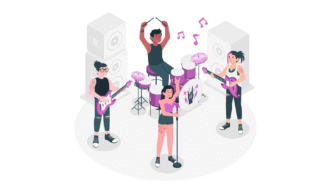LESSON OVERVIEW
The main objectives of this lesson are to:
- discuss different perspectives on personal limits;
- practise vocabulary related to personal boundaries;
- watch an informative video about the topic.
This lesson focuses on talking about personal boundaries. Students discuss personal boundaries, watch a video about it and practise collocations with the word ‘boundaries’. They also identify different types of personal boundaries, study phrases to talk about the subject, reflect upon responses to challenging situations and discuss different points of view.
VOCABULARY AND VIDEO
Before starting the lesson, you can ask students to play the game Four pics, one word. They have to think of a common word (boundaries) that describes four pictures. Then, you continue with a warm-up in which students answer questions and start talking about personal boundaries. After that, they watch the first part of a video about the topic and compare it to their answers. Next, students read common challenges about personal boundaries and say whether they can relate to them. Following that, they examine the statements and complete mind maps to create collocations with the word ‘boundaries’ (e.g. flexible boundaries, clear boundaries, set boundaries, etc.). Then, students complete sentences with the words from the mind maps. Finally, students watch the second part of the video and mark the sentences that are mentioned.
VIDEO
In this part of the lesson, students continue talking about personal boundaries and discuss questions on the topic. Then, they read situations and match them to types of personal boundaries (e.g. time boundaries, emotional boundaries, financial boundaries, etc.). After that, students match people’s possible responses to the situations. They also identify the meanings of some phrases (e.g. accommodate one’s needs, come off as, treat, etc.) in the corresponding responses and discuss them. After that, students analyse some common phrases (e.g. Don’t be sad! It’s nothing!) and explain how people who say them might cross personal boundaries. They also choose four of them and give responses using the target vocabulary. Next, students read a comment questioning the validity of personal boundaries and discuss to what extent they agree or disagree with it.
HOMEWORK/REVISION
This lesson also includes an additional task that you can use as homework or revision. In the task, students complete a text with the target vocabulary. Then, they create a short response. The task is available in the teacher’s version of the worksheet. You can print it and hand it out to your students. It’s also included in the e-lesson plan.
Subscribe to unlock these and many other Standalone lesson with the Premium planWORKSHEETS












Hi! Great lesson plan, the student´s pdf version is not working 🙁
Hi, Garbiela! The problem is likely due to your cookies/cache data. Please open the website in Incognito mode, log in and see if you can access it then. Contact us later via chat or contact form so that we can help you find a permanent solution.